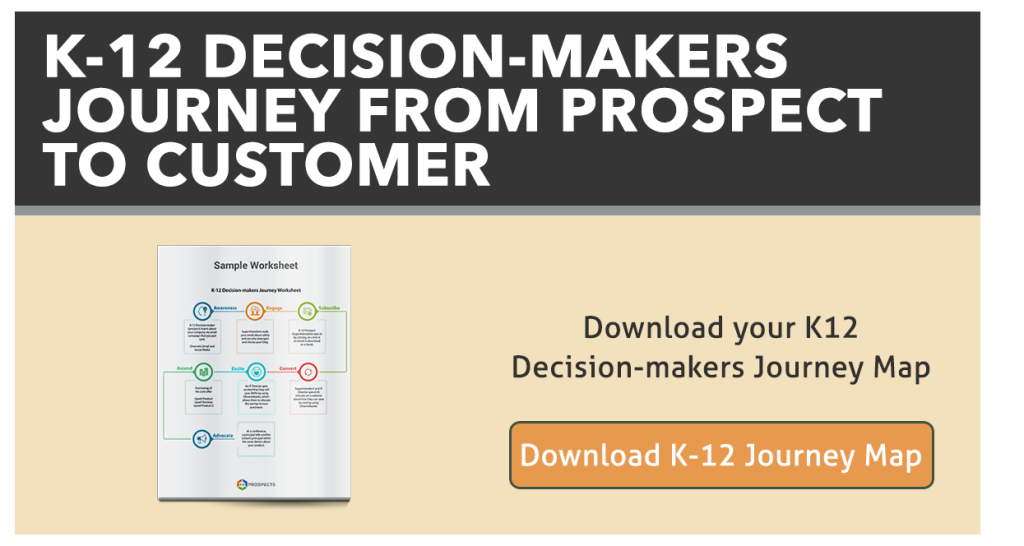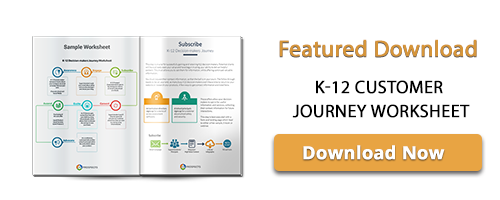Decision-Makers and Influencers: How to Market your Product to Schools and Districts


The questions asked most frequently by our customers are always about people– Who do I market to that makes the decision to actually buy a product? It is a question that can have different answers at the school or district level.
In the K-12 education system there are people responsible for the purchasing decision (decision-makers) and people that push the idea and positive or negative reviews of products (influencers) to the decision-makers. It is important to understand the roles of each and how to best market your product to have the biggest impact.
Meet the School Decision-Makers
At the school level, the decision-maker is almost always the principal. They can make decisions for the schools based on rules and policies within a certain budget. For example they can purchase professional development products for their staff. They can also invite motivational speakers and make smaller purchases, often of around $10,000.
When we asked principals from different states, they answered that they can make decisions to a certain level and that authority varies from state to state. For example a principal in Indiana may have more freedom to make decisions than a principal in Florida. Most will be upfront about what they can purchase and when they need to seek higher approval. Opening up a dialogue with the principal always helps develop a relationship with the school.
Many vendors are under the impression that the principal is the decision-maker about certain curriculum or IT decisions. In this case, the principal will have a lot of influence in the decision but the final decision is actually made by other department heads in the district.
So who are these district-level purchasers?

Technology Directors: Almost all school districts, even small districts, have technology directors. The Technology Director makes buying decisions related to computers, software, implementations of apps etc. Their best advisor is the technology coordinator/specialist. In larger districts, they may even have a team who specialize in different components of their technology plan.
It is worth noting that technology is often used by specialized programs, such as special education, gifted and talented programs, or vocational skills training. While individuals in these areas can have influence over the technology tools purchased, the decision for large-scale programs almost always remains with the Technology Director.
Curriculum and Instructions Director: The curriculum director is responsible for ensuring that all state learning standards are met and students receive the best possible curriculum. Everything related to purchasing of textbooks, digital curriculum tools and apps, and assessment materials falls under the authority of the Curriculum Director. Most of the research and evaluation of products and services are done by the Curriculum Coordinator. Larger districts may have Curriculum Coordinators for each content area or grade level.
Safety And Security Director: Things that are related to safety of the schools and the district is directly related to the Safety and Security Director. Items such as access cards, security alarms, security cameras, panic buttons, bullet proof doors and other physical security are products for which the decision is made with the cooperation of the Department Director and the Superintendent.
Implementing new security protocols often requires the approval of the School Board or other decision-makers and can take additional time to see through to completion. The Safety and Security Director can be the driving force behind these large purchases but will often need higher approval.
Superintendent: Any of the departments above and the rest of district departments report to the Superintendent. This person has the final yes and is at the top of the power chain in the district.
In interviews that we had with the superintendents from different districts, they confirmed that they are involved in almost all purchasing decisions, from basic needs to complicated orders.
School Board: Many vendors forget that the school board is directly involved with spending. The board Director and chair are there to supervise the budget and also give their input on every decision that involves spending.
Who are the influencers and what do they do
We already saw who makes the purchase decisions at the school and district-levels. In most situations, this decision-maker is heavily influenced by the person that is their right hand–the department coordinator or specialist. They do most of the research and evaluation and explain everything to the director in a nutshell.
For example, a customer of ours that sell digital curriculum apps to schools reports that most of the talks, research and platform testing is done by the Curriculum Coordinator. He has separate marketing strategies for presenting the value of the district having the product to the coordinators and the decision-makers. Customizing communication-based on who the intended audience is showcases even better value and benefit for the school and district.
Because the product they sell is less than $10,000, with actual price of $2500 per school, many individuals sales are from principals. When a few principals within the same district buy and use a product, the district gets involved based on recommendations from the principals. In this case, a decision-maker becomes an influencer for a potentially larger-scale purchase.
All things are connected but sometimes it is better for your email marketing campaign to start with influencers and have a separate strategy for the decision-makers.
Always bring value and benefit
We often hear that companies are struggling to get to the right person. Yes, the gatekeeper is there to filter information coming to the busy decision-maker. That is where email comes into the game with a lot of power. But crafting an email that will get read and that prompts action is key. In order to be heard and given attention, you always need to bring value to your audience.
If you bring value and you have their attention, the benefit for you can be great. Superintendents and other district directors have very strong connections with other districts. A good word from the Superintendents mouth among their colleagues can bring in more sales and contracts.


